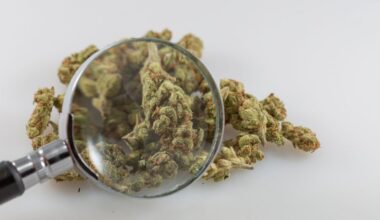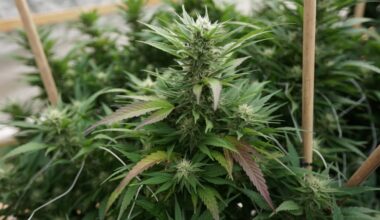Rep. Alexandria Ocasio-Cortez (D-NY) is pushing to add an amendment to a must-pass military bill that would require the Department of Defense to study the therapeutic potential of psilocybin and MDMA for military service members.
The congresswoman recently filed the amendment to the National Defense Authorization Act (NDAA), which would build on a separate provision already attached to the bill in committee that only gives a DOD mandate to research marijuana as an opioid alternative for military members with certain health conditions.
This new amendment is substantively identical to one recently filed by a controversial GOP congressman, Rep. Matt Gaetz (R-FL). There are some technical differences between the two, but the intent appears to be the same. Marijuana Moment reached out to Ocasio-Cortez’s office for comment on the reasoning behind filing the virtually identical amendment, but a representative was not immediately available.
Gaetz, for his part, told Marijuana Moment on Tuesday that he and Ocasio-Cortez “have joined in sponsoring similar legislation previously.”
“I care about the veterans, not the credit,” the congressman said. “I just hope the Rules committee allows a vote on one of the amendments in the full House.”
The original cannabis-focused provision that’s already attached to NDAA for Fiscal Year 2023 also specifies who would be eligible to participate in the marijuana study. It would be limited to service members with post-traumatic stress disorder, a traumatic brain injury or “any other condition involving severe pain.”
Meanwhile, another new bipartisan amendment that’s been filed for NDAA seeks to eliminate the federal sentencing disparity between crack and powder cocaine, similar to a standalone bill that cleared the House but has yet to advance in the Senate despite significant bipartisan support in the chamber. It appears that lawmakers view the defense bill as the best vehicle to get the reform enacted into law at this point.
Advocates and industry stakeholders are also pleased to see that Rep. Ed Perlmutter (D-CO) is again seeking to attach a bipartisan cannabis banking reform legislation as an amendment to the defense bill. This follows congressional leadership agreeing not to include the Secure and Fair Enforcement (SAFE) Banking Act in a separate, large-scale manufacturing bill that’s being considered by a bicameral conference committee.
All of the various drug policy proposals must be made in order by the Rules Committee before potentially receiving House floor consideration. That panel will decide which submitted amendments can be cleared at an upcoming meeting that has not yet been scheduled but is expected to happen next week.
When it comes to psychedelics, Ocasio-Cortez took an early interest in reform, twice introducing amendments to appropriations legislation that would have removed a congressional rider that’s viewed as problematic by restricting studies into Schedule I drugs like psilocybin and marijuana.
Gaetz cosponsored that amendment, but it was defeated on the floor on both occasions it was brought up. The longstanding prohibitive language it targeted is once again being included in the relevant funding bill this year—though it remains to be seen if reform-minded lawmakers will file another amendment to remove it this time.
The Armed Services Committee, meanwhile, also recently approved a separate amendment to NDAA from Rep. Anthony Brown (D-MD). The measure concerns cannabis sentencing standards under military code, mandating that the Military Justice Review Panel “develop recommendations specifying appropriate sentencing ranges for offenses involving the use and possession of marijuana.”
—
Marijuana Moment is tracking more than 1,500 cannabis, psychedelics and drug policy bills in state legislatures and Congress this year. Patreon supporters pledging at least $25/month get access to our interactive maps, charts and hearing calendar so they don’t miss any developments.![]()
Learn more about our marijuana bill tracker and become a supporter on Patreon to get access.
—
Additionally, the House Appropriations Committee recently released a report for a 2023 Fiscal Year spending bill for Commerce, Justice, Science, and Related Agencies (CSJ) that calls for a federal review of psilocybin policy. Specifically, it asks for a Government Accountability Office (GAO) analysis on barriers to state, local and tribal programs for the psychedelic under federal prohibition.
Ocasio-Cortez, as well as Reps. Earl Blumenauer (D-OR), Barbara Lee (D-CA) and Lou Correa (D-CA) had requested that language in a letter to subcommittee leadership in April that was shared with Marijuana Moment, noting that states and localities across the U.S. have started to “relax their prohibitions against the use of psilocybin and other psychedelic substances.”
A manager’s amendment to separate spending legislation covering the Department of Health and Human Service that was released last week also tackles psychedelics policy.
The newly added report language contains two sections addressing the therapeutic potential of psychedelics. One broadly encourages research into the substances as potential treatment options for post-traumatic stress disorder and severe depression, while the other talks about psychedelics as a possible tool to combat conditions that commonly afflict military veterans.
Relatedly, officials at two agencies within the National Institutes of Health (NIH) have acknowledged in a letter to two U.S. senators that federal prohibition makes it harder to study the benefits of psychedelics, requiring researchers to jump through additional regulatory hoops.
Outside of the psychedelics space, there’s are numerous drug policy sections that have been included in appropriations bills and reports for the 2023 Fiscal Year.
Over the past couple weeks, the committee has filed legislation covering issues such as cannabis research barriers, impaired driving and preventing use by youth and pregnant people. Lawmakers recently secured an amendment providing wide-ranging protections for all state, U.S. territory and tribal marijuana programs, building on existing safeguards for medical cannabis programs.
Additional appropriations language encourages sports regulators to push international officials to “change how cannabis is treated” when it comes to suspending athletes from competition over positive tests. Another report also more broadly addresses drug testing requirement for federal workers, as previous versions have done in the past.
Meanwhile, in an education spending bill, there’s again a section that would prevent the Department of Education from penalizing universities simply because the institutions are conducting research into marijuana. A different set of spending bills and reports that were recently released call for protections for immigrants who use cannabis, freeing up marijuana-related advertising and providing the industry with access to the banking system.
Additionally, there are also appropriations provisions covering kratom’s medical potential, as well as several sections encouraging the use of hemp as an environmentally sustainable and cost-effective alternative to plastics that were spearheaded by Rep. Dave Joyce (R-OH).
Importantly, it remains to be seen whether the Senate will accept any of the House-led cannabis and drug policy proposals. Senate appropriators have not yet released their spending bills for FY23, and typically wait until after the House has acted, so it’s not yet clear which issues will ultimately get reconciled by the two chambers and adopted into law.
Image courtesy of Kristie Gianopulos.
Medical Disclaimer:
The information provided in these blog posts is intended for general informational and educational purposes only. It is not a substitute for professional medical advice, diagnosis, or treatment. Always seek the advice of your physician or other qualified healthcare provider with any questions you may have regarding a medical condition. The use of any information provided in these blog posts is solely at your own risk. The authors and the website do not recommend or endorse any specific products, treatments, or procedures mentioned. Reliance on any information in these blog posts is solely at your own discretion.






